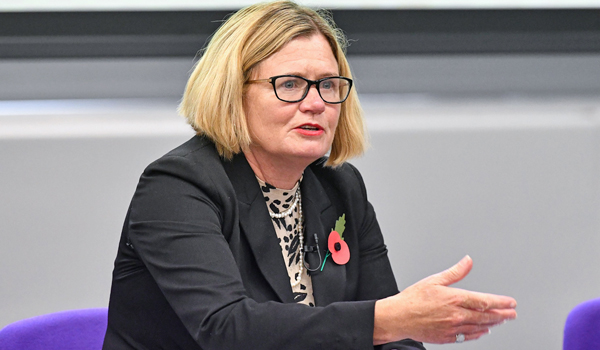NPCC and APCC pledge to help deliver ‘societal change’ to tackle VAWG
The National Police Chiefs’ Council (NPCC) and Association of Police and Crime Commissioners (APCC) have pledged to jointly improve the response to violence against women and girls (VAWG) through stronger partnership working.
Deputy Chief Constable Maggie Blyth, the NPCC’s lead for VAWG, said police cannot solve it alone as “it’s a societal problem that needs societal input”.
She said there is an “enormous responsibility in policing and beyond to ensure that women and girls’ safety is central to all our plans”, adding: “We are only going to be able to tackle VAWG if we work together and commit to making it a priority.”
While positive steps have been taken in tackling VAWG, the NPCC said there is a “clear recognition from policing that there is a long way to go”.
Recent reports from His Majesty’s Inspectorate of Constabulary and Fire and Rescue Services (HMICFRS) have highlighted some of the areas in which policing is still letting down the public and victims, and at their annual Partnership Summit both the NPCC and the APCC said they are “determined to take action”.
This year the NPCC and College of Policing launched the first NPCC VAWG Framework and will be publishing the first set of baseline metrics over the coming weeks.
The NPCC and the College of Policing have also published a review into misconduct, which outlines the actions that will be taken forward.
The APCC has also released its own Action Plan for tackling VAWG.
While policing leadership must drive much of this change, the NPCC said there is also a recognition that VAWG is a societal issue that policing alone will not be able to solve.
Ms Blyth told delegates that she recognised “that women and girls have lost their trust in policing so they won’t report”.
“As we start the second year of the national policing focus on VAWG, we continue to be committed to deliver effective and long-lasting solutions to keep women and girls safe,” she added.
“The police alone cannot solve violence against women and girls as it’s a societal problem which needs societal input.
“Today we are pledging our commitment to work alongside the APCC and other key partners to deliver societal change.
“We will work together to support victims but we are also clear that it is the behaviour of those who harm women and girls and cause them to feel unsafe whose actions must be challenged.
“Violence against women and girls is unacceptable and will not be tolerated by society.”
Both the the NPCC and APCC said there is a “critical role” that partners across England and Wales play in health, education, child protection, housing, local government and the wider criminal justice system, alongside organisations which work in technology and the night-time economy.
Working together, three key priority areas have been identified and developed by listening to women and girls and proposing activity that they feel will make a real and sustained difference to their lives:
- Early intervention and prevention of child abuse and sexual harassment in educational settings;
- A victim-focused approach to improving outcomes for victims of violence against women and girls; and
- Establish women and girls’ right to feel safe in public spaces and online.
Donna Jones and Sophie Linden, joint victims’ leads at the APCC, said: “On behalf of all victims and survivors, more must be done to address the failings in the current system which are letting down women and girls; it is not good enough.
“It is police and crime commissioners’ (PCCs) top priority to hold policing and partners to account for delivering better outcomes on VAWG.
“PCCs are at the forefront of driving local partnerships. It is our role to convene partnerships and to hold policing to account for delivering positive change.
“Despite the good first steps that have been taken by policing, there is still a long way to go and it is crucial that VAWG is prioritised across all sectors to develop a public health approach which supports true societal change.
“It’s only by bringing partners together that we can weave the golden thread of VAWG activity throughout social policy.
“We look forward to developing our partnership statement of intent together with the NPCC so we can deliver positive change for women and girls.”
The APCC and the NPCC said they are developing a partnership plan due to be published by the end of the year and which will include proposals to bring together a national VAWG strategic partnership board to oversee and focus on agreed approaches.
There is a different set of circumstances in Wales where policing operates in a devolved environment, working with Welsh government and devolved agencies as well as partners across the criminal justice system.
VAWG is “a declared priority” for both policing in Wales and for Welsh government, with a joint blueprint setting out a shared approach to tackling violence against women, domestic abuse and sexual violence.
The Criminal Justice Board for Wales includes non-devolved agencies (such as Probation, Court Service, the Crown Prosecution Service and police) and bodies that come under the aegis of Welsh government (including Public Health Wales, the Welsh Local Government Association and youth justice teams) with a shared focus on prevention and on meeting the needs of victims.
However, police leaders also play an active role in addressing VAWG with colleagues across England and Wales through the APCC and the NPCC.


